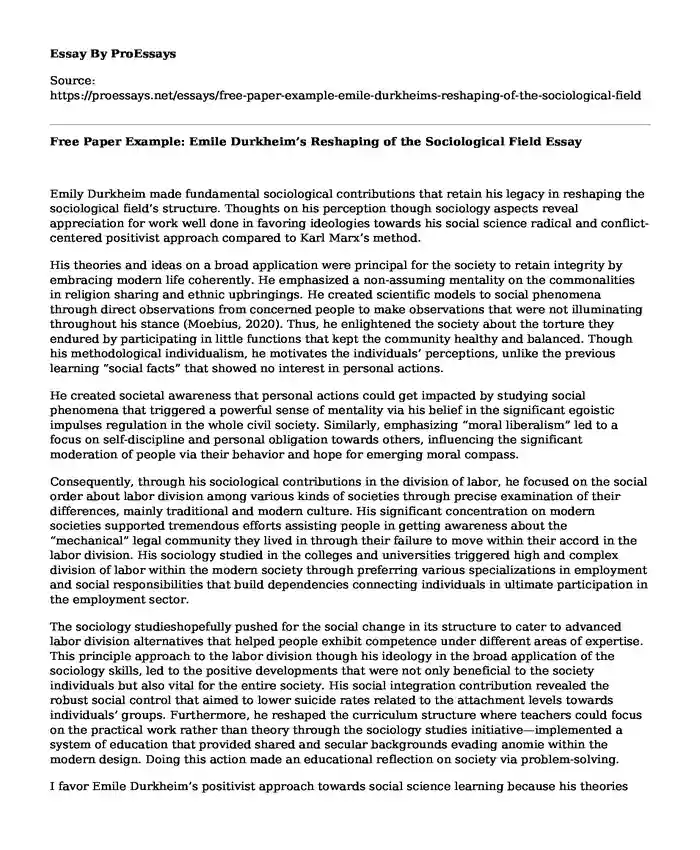Emily Durkheim made fundamental sociological contributions that retain his legacy in reshaping the sociological field’s structure. Thoughts on his perception though sociology aspects reveal appreciation for work well done in favoring ideologies towards his social science radical and conflict-centered positivist approach compared to Karl Marx’s method.
His theories and ideas on a broad application were principal for the society to retain integrity by embracing modern life coherently. He emphasized a non-assuming mentality on the commonalities in religion sharing and ethnic upbringings. He created scientific models to social phenomena through direct observations from concerned people to make observations that were not illuminating throughout his stance (Moebius, 2020). Thus, he enlightened the society about the torture they endured by participating in little functions that kept the community healthy and balanced. Though his methodological individualism, he motivates the individuals’ perceptions, unlike the previous learning “social facts” that showed no interest in personal actions.
He created societal awareness that personal actions could get impacted by studying social phenomena that triggered a powerful sense of mentality via his belief in the significant egoistic impulses regulation in the whole civil society. Similarly, emphasizing “moral liberalism” led to a focus on self-discipline and personal obligation towards others, influencing the significant moderation of people via their behavior and hope for emerging moral compass.
Consequently, through his sociological contributions in the division of labor, he focused on the social order about labor division among various kinds of societies through precise examination of their differences, mainly traditional and modern culture. His significant concentration on modern societies supported tremendous efforts assisting people in getting awareness about the “mechanical” legal community they lived in through their failure to move within their accord in the labor division. His sociology studied in the colleges and universities triggered high and complex division of labor within the modern society through preferring various specializations in employment and social responsibilities that build dependencies connecting individuals in ultimate participation in the employment sector.
The sociology studieshopefully pushed for the social change in its structure to cater to advanced labor division alternatives that helped people exhibit competence under different areas of expertise. This principle approach to the labor division though his ideology in the broad application of the sociology skills, led to the positive developments that were not only beneficial to the society individuals but also vital for the entire society. His social integration contribution revealed the robust social control that aimed to lower suicide rates related to the attachment levels towards individuals’ groups. Furthermore, he reshaped the curriculum structure where teachers could focus on the practical work rather than theory through the sociology studies initiative—implemented a system of education that provided shared and secular backgrounds evading anomie within the modern design. Doing this action made an educational reflection on society via problem-solving.
I favor Emile Durkheim’s positivist approach towards social science learning because his theories are insightful for the society’s structure, indicate the relationship between individuals and the community. The ultimate developments emanating from these theories led to transforming from simple to complex. There is a clear connection between human social nature and the associated products that indicated how to go in sociology that impacted possible applications. His contribution differed from Karl Marx in many fundamental ways that show his perfect contribution to sociology (Dillon, 2020). For instance, through Karl Marx, we have unemployment showing evidence of people with more powerful/privileged positions that portrayed taking of advantage over others rather than bringing the desired solution to the society.
References
Dillon, M. (2020). “Introduction to sociological theory: Theorists, Concepts, and their applicability to the twenty-first century.”John Wiley & Sons. https://books.google.co.ke/books?hl=en&lr=&id=diC3DwAAQBAJ&oi=fnd&pg=PA11&dq=Emile+sociological+theory+on+education,+religion,+and+division+of+labor+in+2020&ots=_J6unraUBy&sig=rpfnK7WLBRsAmZp2JPw87XyWZTk&redir_esc=y#v=onepage&q=Emile%20sociological%20theory%20on%20education%2C%20religion%2C%20and%20division%20of%20labor%20in%202020&f=falsehttps://www.newworldencyclopedia.org/entry/Emile_Durkheim
Moebius, S. (2020). “Sociology of the Sacred.”In The Oxford Handbook of Émile Durkheim.https://www.oxfordhandbooks.com/view/10.1093/oxfordhb/9780190679354.001.0001/oxfordhb-9780190679354-e-25
Cite this page
Free Paper Example: Emile Durkheim's Reshaping of the Sociological Field. (2023, Dec 16). Retrieved from https://proessays.net/essays/free-paper-example-emile-durkheims-reshaping-of-the-sociological-field
If you are the original author of this essay and no longer wish to have it published on the ProEssays website, please click below to request its removal:
- The Impact of Social Media on the Society Essay
- The Impact of the Office Environment - Essay Sample
- Essay on Struggling With an Ethical Dilemma: A Tough Decision Ahead
- Essay Sample on Claude Shannon and Warren Weaver's Model of Communication: Exploring Signal Transmission
- Legal and Ethical Issues With Surrogacy Essay
- Biography Sample on Jane Addams: Champion of Peace, Philanthropy, Work Ethic
- Commitment to Social Work: Pursuing a Master's Degree with a Focus on Social Justice and Diversity - Free Paper







